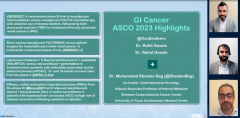
IMbrave050: Adjuvant Therapy for High-Risk Hepatocellular Carcinoma
The Oncology Brothers, joined by Muhammad Shaalan Beg, MD, share their thoughts on data from the IMbrave050 trial investigating adjuvant atezolizumab plus bevacizumab in patients with high-risk hepatocellular carcinoma.
Episodes in this series
Rahul Gosain, MD: Thank you Dr Beg. Now let us jump to a different disease site for our last study IMbrave050. We know that atezolizumab and bevacizumab was approved in metastatic HCC. This study is looking at the same combination in adjuvant settings. Dr Beg your thoughts here?
Muhammad Shaalan Beg, MD: Liver cancer and biliary cancers have probably been some of the most exciting areas to be working in within the GI cancer space over the last five years. We've seen the emergence of first single agent immunotherapy and then combination of VEGF and immune therapy or immunotherapy combinations in the meta- in the advanced HCC space. But to date, adjuvant therapy after surgery or ablation in liver cancer have not yielded positive clinical trials until now. This trial took people who had surgery or ablation with Child-Pugh A liver disease and randomize them to receiving active surveillance which is very appropriate acceptable regimen for this group of patients prior to this trial and compare it with atezolizumab bevacizumab which is a combination that is approved for the treatment of advanced hepatocellular carcinoma. And they followed folks until recurrence or unacceptable toxicity. And they did allow for crossover so folks that were on surveillance could receive this treatment subsequently, which we know they would have gotten as far as standard of care, but it's good to have worked that into the regimen as well because this trial was enrolling before the FDA approval of that combination. And there's a fairly clear separation of curves between the treatment versus surveillance arms, with atezolizumab bevacizumab arm in blue, showing the 12-month recurrence-free survival of 78% versus 70% for the group that was on active surveillance. How can we use biomarkers to help select people in a more rational manner to receive this combination treatment? Who are the folks that are going to benefit? Who are the folks that are not going to benefit? We don't have those answers, but as a group for Child-Pugh A patients who have received curative resection or ablation for their liver treatments, we have very clear indication that a combination of atezolizumab and bevacizumab can delay recurrences. For this group of patients that are often suffering from cirrhosis, this regimen can be a game changer, I think we need to be aware of immune side effects, we need to be aware of vascular side effects that this regimen can cause. But for a Child-Pugh A group of patients who are fit for surgery, I don't expect there to be too many challenges in the adoption of this regimen for this group of patients.
Rohit Gosain, MD: Certainly, especially with the unmet need when these patients recur after surgery itself, now we have RFS which is pretty promising, but would you suggest before we utilize this in our day-to-day practice, to rely on until OS is presented, or this is ready for primetime?
Muhammad Shaalan Beg, MD: The HCC population can be a little tricky when it comes to overall survival. There is a fairly high rate of non-oncologic mortality in this group of patients as well, because even though they're- even though they're- they have Child-Pugh A disease, they do have cirrhosis by definition, most of them will have cirrhosis, they develop HCC. And once you start looking at survival that are extending beyond one or two years, and we're seeing the impact of surgery and other systemic therapies, we can see hepatic dysfunction creep in and be a major cause of morbidity and mortality in a group of patients. So once the overall survival results come out, I think one of the interesting aspects is going to be whether we can tease out cancer-specific mortality versus not. So, for almost any other adjuvant population, your question was easy, yes, we need to wait for the overall survival results. For this group of patients, there's lots of caveats with the overall survival data as well. So, I'm really excited with the recurrence-free survival as being the surrogate endpoint for where we are in the adjuvant space and I'm excited to see what the regulatory agencies and guideline agencies how they perceive these results.
Rohit Gosain, MD: We have covered a lot of data here today. Dr Beg, thank you so much for joining us and going over these important studies from GI space from ASCO 2023. For our listeners, stay connected for a quick recap.










































